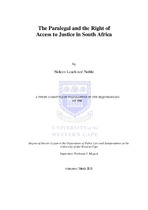| dc.description.abstract | Political settlements in post-conflict democracies such as South Africa with its accompanying
constitutional reforms have altered the relationship between citizens and the State, creating a new order
of citizen entitlement and state responsibilities resulting in different expectations about the law, judicial
systems and other dispute resolution mechanisms. The post-apartheid government in South Africa
introduced various measures to enhance access to justice for the most vulnerable communities in the
country. However, poverty, unemployment and inequality threaten South Africa’s constitutional
democracy. Lack of access to justice and its related socio-economic and health problems create a fertile
environment for disillusioned communities to take the law into their own hands with serious
consequences for the rule of law, human security, peace and stability.
Measures on the part of the State to remove the barriers to access to justice remain mainly top-down
and are predominantly focused on ‘the rule of law orthodoxy’, a classical definition of access to justice
and the private legal profession. The status quo remains in spite of the fact that the interaction of many
citizens with the law occurs mostly outside of the formal justice system. The community-based
paralegal has rendered a crucial socio-legal service without formal recognition in South Africa among
these communities since before 1994. However, the continued existence and efficacy of this service is
threatened by its exclusive reliance on donor funding and volunteerism, the lack of accredited education
and training and lack of recognition and regulation.
This thesis investigates whether the existing human rights framework creates scope for the communitybased
paralegal to enhance access to justice in South Africa and, as a consequence, contribute to the
transformation of the legal profession. The focus is on section 34 of the Constitution of South Africa,
1996 which guarantees the right of access to procedural justice in civil matters. This right is rendered
meaningless without the right to legal assistance, which includes legal aid, where the interest of justice
so requires, and legal representation by a legal or a paralegal practitioner. This thesis therefore first
considers the legal empowerment paradigm as a philosophical and theoretical framework for access to
justice in South Africa; secondly, examines the values that shape the new constitutional order in the
country; thirdly, determines the nature, content, application and limitation of the right of access to courts
and other dispute resolution fora and the derivative right of access to legal assistance. It further
examines, in brief, the extent to which the courts and other dispute resolution fora create scope for
paralegal assistance and tracks the legal reforms in the legal profession with a view to determining the
scope that these reforms create for a paralegal ‘profession’. The study finally examines the communitybased
paralegal landscape in South Africa and the paralegal landscape in a number of economically
developed and developing countries to establish the features that would define a paralegal profession in
the country. | |

